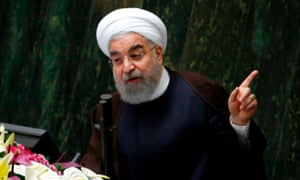The Guardian | Saeed Kamali Dehghan: When Ali�s father-in-law had a stroke in the Iranian city of Shiraz last year, the 67-year-old shopkeeper was rushed to Namazi hospital, where he received treatment for 20 days, including six days in intensive care.�
While his father-in-law recovered, Ali turned his mind to how he would pay for the care. He borrowed money to build up a 100m rials (�2,000) reserve. But when he picked up the bill, it amounted to just 5.8m rials (�116).
�We thought they may have forgotten to add a zero,� he told the Guardian. �I looked at my brother-in-law, and we laughed. This was considerably less, it was almost nothing.�
Before he fell ill, Ali�s father-in-law had joined the healthcare programme brought in during President Hassan Rouhani�s first term, a scheme announced in 2014 and�nicknamed�Rouhanicare, in apparent homage to�Obamacare, Barack Obama�s patient protection and affordable care act. It meant that Ali and his family were only expected to pay a fraction of the total 128m rials.

In the course of the past three years, Rouhani�s health ministry has insured nearly 11 million Iranians, meaning that those who were not previously covered, like the unemployed or the poor, are now protected.
Read More Here�

 QR code
QR code